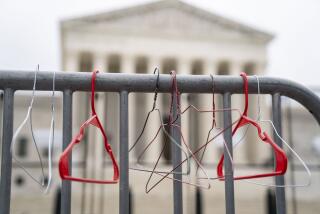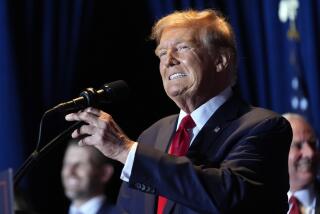The nation’s huge partisan gulf threatens to swallow the Supreme Court, too
Three times over the past three decades, a Supreme Court nomination has touched off a battle so brutal as to become a national byword: Robert Bork, Clarence Thomas, now Brett Kavanaugh.
The past two times, the high court has survived as a trusted institution. Public confidence in almost all American institutions has declined in recent decades, but confidence in the high court has not suffered the plummeting fortunes of Congress or the deep polarization which has affected Presidents George W. Bush, Obama and Trump.
The current struggle, which could end with a Senate vote on confirmation early next week after the Judiciary Committee votes Friday to advance the nomination, threatens lasting harm. The Bork and Thomas fights created bitter memories among Washington operatives, but successive presidents and Senate leaders tamped the partisan fires. This time around, each side seems determined to further fan the flames.
Sign up for the Essential Politics newsletter »
ARCHETYPES FOR POLARIZED TIMES
Christine Blasey Ford, a middle class, female university professor from California, could almost personify the Democratic Party and its resistance to Trump.
She showed in her testimony Thursday that she’s no political conspirator; indeed, her evident innocence of the wiles of politics gave her words much of their credibility. But the simple facts of who she is made her a potent symbol.
The same holds true for Kavanaugh, although with a twist.
As the Yale-educated son of an influential Washington lobbyist, he’s certainly far removed in social class and upbringing from the rural, evangelical Protestant, non-college-educated voters who make up so much of Trump’s political base. But as a longtime Republican operative, he instinctively knew how to tap the same well of grievance against liberal elites that has cemented those voters to Trump.
The allegations against Kavanaugh mounted during the week. That may not have helped his opponents. The third allegation, in particular, brought by a computer security contractor named Julie Swetnick, gave Republicans an opportunity to take shots at her attorney, Michael Avenatti, and portray all the accusations as political.
Still, as David Savage wrote, some of the biggest problems Kavanaugh faced stemmed from his own words and the conflicting accounts he has given of his teenage drinking.
Among the other figures who have been bruised by the Kavanaugh fight — Sen. Dianne Feinstein. As Sarah Wire wrote, the senior Democrat on the Judiciary Committee has gotten intense criticism from Republicans over how she handled the accusations against the nominee.
We still don’t know if the wrenching and emotional testimony on Thursday actually changed a single Senate vote. Sen. Jeff Flake of Arizona, who had insisted he wanted a hearing where Ford could speak, announced Friday that he would give Kavanaugh the benefit of the doubt.
As Jennifer Haberkorn, Wire and Savage wrote, when the final roll call comes early next week, the deciding votes, and as has often been the case, appear to be in the hands of Sens. Susan Collins of Maine and Lisa Murkowski of Alaska.
But any forecast of the vote has to begin with the reality that the 51 Republican senators who make up the majority represent a constituency that’s much whiter, more conservative and more rural than the nation as a whole.
Because each state has an equal vote in the Senate, the chamber has always had a counter-majoritarian aspect. That’s more true now than it was a generation ago when Thomas won confirmation, and likely will be even truer after this year’s midterm elections.
Against that background, Ford’s accusation of sexual assault and Kavanaugh’s angry denial and counter-accusation of a left-wing plot to destroy his good name could not have been better designed to widen the gulf separating the two sides of a polarized nation.
TRUMP SETS A TONE
The anger in Kavanaugh’s voice as he denounced the allegations against him pleased the man who nominated him, aides said.
Trump had thought Kavanaugh didn’t show enough fight earlier in the week when he sat for an interview with Fox. And he publicly blamed Senate Republicans for not ramming the nomination through to a vote more quickly, before the accusations against Kavanaugh could take root.
On Tuesday, he denounced the allegations as part of a “con game,” as Wire and Eli Stokols wrote.
Then on the eve of the hearing, he amplified his complaints, saying for the first time publicly that his view of the allegations against Kavanaugh was colored by his own experience of having been accused of sexual misconduct.
If Kavanaugh wins confirmation, Trump will surely claim credit for having rescued the situation.
If he loses, the president will blame Senate leaders and implore voters in red states to send him more loyal backers. That prospect continues to worry some Democratic strategists, who have tried to protect incumbents running for reelection in places like West Virginia, Indiana and North Dakota — the three states whose Democratic senators have yet to announce how they will vote.
DECISION CALIFORNIA — THE MIDTERMS
The fight over Kavanaugh might help Republicans in those Senate races. But it also has a strong chance of hurting Republicans in House races, especially the many suburban districts up for grabs this year.
Republicans already face a severe deficit with suburban women, and Kavanaugh could make it worse, Michael Finnegan wrote, examining the impact in one such district — California’s 25th, in northern Los Angeles County.
The Democratic candidate, Katie Hill, who is trying to unseat Republican Rep. Steve Knight of Palmdale, says in a new video she released that she knows how hard it is for women to report an attack. If Americans look the other way, she says, “we are showing to boys and men across the country that it’s OK.”
Hill seems well positioned in her race, judging by early polls. But farther south, Republican Rep. Duncan Hunter leads in his reelection fight despite a federal indictment, according to a new Monmouth University poll. The poll found Hunter ahead of Ammar Campa-Najjar, his 29 year-old Democratic opponent, 49%-41%, Christine Mai-Duc reported.
In a heavily Republican part of San Diego County, “one in 10 voters in this district think Hunter is probably guilty of campaign fraud, but they are going to vote for him anyway,” said Patrick Murray, director of the nonpartisan Monmouth survey.
Hunter’s campaign this week denied he implied his opponent is a radical Muslim. Campa-Najjar, whose ancestry is Mexican and Palestinian, is Christian.
Anti-Muslim bias runs deep in some quarters. So does prejudice against Republicans. Mark Barabak examined both when he looked at what happened when a GOP congressional candidate walked into a mosque.
DEMOCRATS WELL POISED FOR GAINS, POLL FINDS
Growing support from women has driven up the numbers for Democrats in advance of the midterm elections, the latest nationwide USC-Dornsife/L.A. Times Poll found. Republicans have suffered defections from suburban women and married white women, both longtime mainstays of their party.
The survey also found Republicans lagging behind their usual numbers among voters 65 and older. The combination has put Republican candidates in a bind, especially in suburban districts.
WHAT A DEMOCRATIC HOUSE WOULD LOOK LIKE
Maxine Waters is one of Trump’s fiercest critics. The Los Angeles Democrat will get a powerful new platform if Democrats take the House, Jim Puzzanghera wrote.
Waters is in line to chair the House Financial Services committee, which oversees federal regulation of banking. Rep. Adam Schiff of Burbank would likely chair the Intelligence Committee if Democrats regain the majority
Other Californians are in position to chair influential committees and subcommittees throughout the House.
TUNING OUT THE NOISE
Proteges of Ken Starr, the independent counsel who investigated President Clinton, can be found in senior positions across Washington. In an interview, Starr told Del Wilber that he picked young lawyers who could “tune out the noise” and focus on the task at hand.
This week, two of the most prominent alumni of Starr’s investigation, Kavanaugh and Rod Rosenstein, had that ability tested, Wilber wrote as he examined the Starr connection.
Trump flirted this week with the possibility of firing Rosenstein, but, by week’s end, it appeared that the Justice Department official overseeing the Russia investigation, will stay — for now, Wilber and Chris Megerian wrote.
TRUMP AT THE U.N.
As the Kavanaugh drama unfolded in Washington, Trump was in New York for the annual meeting of the United Nations General Assembly.
Last year, he used that forum to denounce Kim Jong Un of North Korea as “Rocket Man” in a speech that many diplomats felt threatened war. This time, by contrast, Trump praised North Korea’s dictator and suggested another summit meeting could be coming soon. He saved his belligerent rhetoric for Iran, Tracy Wilkinson, David Cloud and Stokols wrote.
Rather than epithets, Trump’s speech this year may be remembered for the reaction from the assembled diplomats and chiefs of state: They laughed when Trump boasted of his achievements. Trump later claimed the laughter was with him, not at him, but he clearly seemed surprised when it happened.
Trump also accused China of trying to interfere in the November election as trade tensions with Beijing continue to grow. In the past, he has called Chinese President Xi Jinping a “friend.” This time, he said he wasn’t sure of that.
One topic Trump avoided: Climate change has swelled the ranks of refugees worldwide. That topic was a focus for U.N. discussion. But the administration dismisses climate change as an issue and has cut back heavily on admitting refugees to the U.S., both moves that have taken the U.S. largely out of the refugee discussion.
“Climate change is the force multiplier for chronic social and environmental problems,” Tim Ash Vie of the Climate Group, an advocacy organization working to counter global warming, told Wilkinson.
LOGISTICS
That wraps up this week. Until next time, keep track of all the developments in national politics and the Trump administration with our Essential Washington blog, at our Decision California page and on Twitter @latimespolitics.
Send your comments, suggestions and news tips to politics@latimes.com.
If you like this newsletter, tell your friends to sign up.
More to Read
Get the L.A. Times Politics newsletter
Deeply reported insights into legislation, politics and policy from Sacramento, Washington and beyond. In your inbox three times per week.
You may occasionally receive promotional content from the Los Angeles Times.







